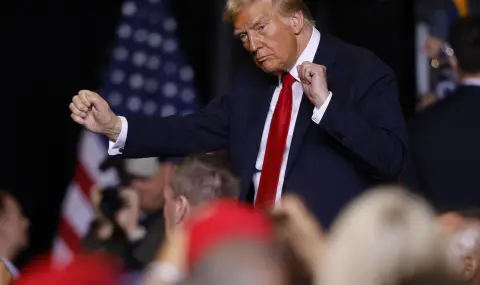Republican Donald Trump defeated Democrat Kamala Harris in the states of North Carolina and Georgia in the US presidential election on Tuesday, Edison Research predicted, bringing him closer to a stunning political comeback four years after leaving the White House, Reuters quoted.
The outcome remains unclear in five other states expected to decide the winner.
Trump showed support in large swaths of the country, winning 248 Electoral College votes to Harris' 216. To claim the presidency, a candidate needs at least 270 votes in the Electoral College.
Trump's wins in North Carolina and Georgia left Harris with a narrow path to victory, targeting the trio of "rust belt" — Michigan, Pennsylvania, and Wisconsin, where, however, she trailed in all three states. The former president headed to a convention center near his home in Palm Beach, Florida, to speak to supporters, a campaign aide told Reuters.
Republicans also won a majority in the US Senate after picking up Democratic seats in West Virginia and Ohio. Both parties remain in a contested race for control of the House of Representatives, where Republicans currently hold a slim majority.
On Election Day, Trump had a 50-50 chance of winning back the White House — a remarkable turnaround from January 6, 2021, when many pundits considered his political career over. On that day, his supporters stormed Congress in an attempt to overturn the results of the 2020 election.
Trump has increased his support among Hispanics, traditionally Democratic voters, and among lower-income households that have felt the rise in prices since the 2020 election, Edison exit polls show. He won 45% of Latino voters, trailing Harris with 53%, but is up 13 percentage points from 2020.
Voters who see the economy as a top concern overwhelmingly chose Trump, especially those who feel worse off financially than they did four years ago. About 31 percent of voters cited the economy as their most important issue and favored Trump by a margin of 79 percent to 20 percent. About 45 percent said their financial situation is worse today than it was four years ago, and they favored Trump by 80 percent to 17 percent for Harris.
Global investors were increasingly expecting a Trump victory at the end of election day on Tuesday. U.S. stock futures and the dollar rose, Treasuries also rose, and Bitcoin rose — deals that analysts and investors see as an indicator of market confidence in a Trump victory.
"Our county-by-county analysis in key states shows Harris trailing in 2020, and on that basis, the market is starting to reflect the likelihood of a Trump victory, as evidenced by gains in bonds and the dollar," said Jens Nordvig, CEO of analytics company Exante.
At Howard University, where a party was being held in support of Harris, supporters left in droves, anticipating that the vice president would not address the crowd Tuesday night. Cedric Richmond, co-chairman of Harris's campaign, announced to the crowd that she would not be speaking: “We still have to count the votes," he said. "There remain states where the results are not yet clear."
